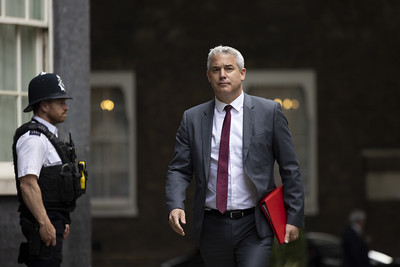Steve Barclay has an army of willing allies to make sure he succeeds – Inside track
4 min read
When Steve Barclay arrives at Defra, he’ll find a department rife with opportunity and challenge. It used to be viewed as a ‘junior’ department, generally one of the last in any reshuffle. But post-Brexit, environment, farming and fisheries policy has become the responsibility of the UK nations, bumping up Defra’s portfolio. As outgoing Environment Secretary Therese Coffey said in her resignation letter, Defra touches so much of our lives and has the potential to change them for the better.
What should he do first?Co-ordinating and championing cross government delivery of the Environmental Improvement Plan must be at the heart of Steve Barclay’s mission. While the plan is welcomed and supported, it won’t be delivered by accident and will need to stay high on all departmental agendas.
The UK’s global environmental leadership matters. Why? Because the commitment to protect at least 30 per cent of our land and sea for nature by 2030 has already been agreed with our international partners, and their gaze will be on the government’s plan to meet the target. This, and the Land Use Framework, are going to be the essential levers in future policy on nature restoration, climate action and food production.
Other undelivered promises need reviving, such as the pledge to stop our precious peatlands being dug up for garden compost by 2024 and plans to ban the products of illegal deforestation from UK supply chains. As the election edges closer, there will be votes in fulfilling them, so the government will need to ensure they are acted on.
The government said it wanted to be a “world leader” on resource efficiency and minimising waste, but that has since floundered and would be worthy of his early attention as resource extraction and problems caused by waste are such a huge driver of nature harm and climate change.
There are so many farmers wanting to take action on climate and nature that currently can’t because they are being denied support under Defra’s new farming schemes. Increasing the capacity of those schemes should be an easy win.
Fragmentation of environmental policy across the UK has grown, as the UK Internal Market Act kicks in. Cross government relationships have been undermined by Westminster legislating without the consent of devolved administrations. The UK’s environmental commitments will only be met by the four governments working together, so renewed diplomatic efforts on domestic co-operation should be high on his action plan.
It’s time to restore departmental relationships To address Defra’s growing ‘to do’ list, the department has appointed a second permanent secretary and created a new director general role focused on delivery. The previous secretary of state promised to “get a grip” on delivery and set up a dedicated unit to support this. While welcome, this hasn’t yet managed to unblock many of the delayed policies so more needs to be done to get the wheels turning.
Where the department has struggled recently is on its relationships. Last year, the previous environment secretary, Ranil Jayawardena, chose only to meet with business bodies and developed an antagonistic relationship with environment sector leaders, fuelled by the then government’s wider ‘attack on nature’. His successor, Thérèse Coffey, rarely embraced external partnerships or discussions with the sector with any enthusiasm, which undermined trust and led to significant opportunity costs in policy making, when policy was announced without testing. While Michael Gove’s ‘sleeves rolled up’ style roundtables with relevant interests, when he was in post, may now be a distant memory, there would be many advantages in renewing that approach to exploit the considerable expertise and experience of stakeholders.
Defra has previously developed and championed innovative forms of engagement, leaving other government departments trailing in its wake. The process to establish the Office for Environmental Protection is one such example, where a multi-stakeholder engagement process was pursued in a collaborative spirit throughout. Views and experiences were not only invited, but visibly improved the policy offers.
The disinclination of recent ministers to engage must now be consigned to history. Steve Barclay inherits a team of values-driven officials, experienced ministers and a stakeholder community that wants to see his department flourish and succeed. It is in no-one’s interest for Defra to develop policy behind closed doors and exclude sensible voices from its thinking.
He must be a strong voice at the cabinet tableThe relationship with the centre and other departments will be vital. As No 10 becomes increasingly focused on the election, a reasoned, firm and tactical environmental advocate at the cabinet table will be necessary. A steely nerve is required. Steve Barclay must hold his own in cabinet discussions, and remind colleagues of the long term importance of the environmental agenda, when short termism risks clouding judgement on the level of public saliency and the real world risks of inaction.
The new duty on all ministers to build environmental principles into their work is a timely gift to him, giving him a framework through which to query, cajole and challenge the prominence given to the environment by his colleagues across Whitehall. It appears the duty has been genuinely embraced by the government, with a desire for it to be powerfully informative; this may not endure indefinitely, but actively using it as key tool now would seem an opportunity not to be missed and one that will help to embed it as a habit in government policy making.
Government is constant, but ambition and delivery can wane. If Steve Barclay can truly unleash the ‘decade of delivery’, promised by his predecessor, he will leave a strong legacy for a government that promised to give us the most ambitious environmental programme of any country on earth. We stand ready to play our part in making sure that happens.
Image credit: Ministers arrive to attend the weekly Cabinet meeting | Flickr





